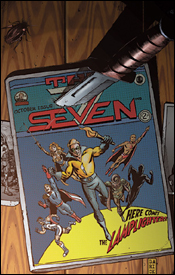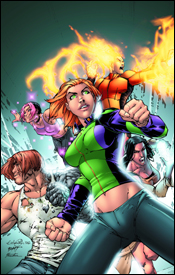Something Old, Something New:
The Boys #3 & Gen13 #1
By Michael David Sims
18 October 2006 Each Wednesday I aim to review two recently released comic books: one from a series I've been reading for a while, and one from a series I'm picking up for the first time (or the first time in a long time). Something old and something new, just as the title implies. At the end of each review I will then note whether or not I'm going to continue reading the series. However, as you will see over time, dear readers, the options go beyond a simple yes and no.
 The Boys #3
The Boys #3
When you crack open a Garth Ennis-written comic book, you know what to expect: smart storytelling, well-rounded characters, a deep look at whatever subject he has on his mind (i.e. war, politics, religion), as well as an overabundance of violence, brash language and sexual content. But those more unsavory elements are usually reserved for the right moment, sprung for the occasional chuckle or when the story truly calls for it. When he goes overboard and makes them the focus, however, then he's lost me. And that's exactly what's happened here.
The Boys started out quite strong, with Ennis and Robertson taking two issues to introduce Wee Hughie (and readers by proxy) to this amazing world of assassinating superheroes most of whom are assholes. The problem is, besides the accidental death of Hughie's girlfriend at the hands of A-Train, nothing has happened thus far. Don't get me wrong, the characterization of The Boys is awesome, and inflections and dialects change depending on the characters. One expects nothing less from Ennis. But three issues in, after spending upwards of $8.97, readers deserve a little more in way of action and plot advancement. One can buy a mass market paperback for around $7.99. After three chapters and that's exactly what individual comic book issues are, chapters the thrust of the story has been laid before the reader and everything is smoothly underway. Why are comics so different? I'm not usually one to gripe about compressed and decompressed storytelling in fact, I'm usually for decompression as so long as I feel the issue gave me my money's worth in terms of story advancement and I understand that the creative team has a 60-issue / five-year goal so there are bound to be some lulls in the action and whatnot, but even the 66-issue Preacher and 60-issue Transmetropolitan had their fair share of action and story advancement by issue number three. So then, why not The Boys?
Pacing be damned, what sets me off more about this comic book is the portrayal of the superfolks. So far all but one, that being Starlight, has been a complete and utter douchebag. That is the point Ennis is attempting to convey that these unchecked, over-powered, adrenaline junkies have let the freedom of being a vigilantly and the celebrity of it all go to their heads but they can't call be assholes! In this world, however, it would seem they are. And it's a bit much. When A-Train accidentally killed Hughie's girl and the government paid him off, it didn't seem right but by no means was it appalling. (After all, cities and police departments pay wrongful death suits all the time.) Two issues later, when three members of The Seven (a Justice League analogue) sexually assaulted the naοve Starlight, things got under my skin. It's attention grabbing, immature schlock akin to a message board troll plastering "more rape plz lol~" in a thread dedicated to this book.
Unless this incident comes back, this isn't what The Boys should be fighting. By no means am I saying sexual assault should go unchecked, but The Boys are designed to make sure normal people don't get screwed over by superheroes and their government protectors. Vilifying Superman, Batman and Flash counterparts through rape is the aforementioned "overboard" Ennis sometimes resorts to for laughs or slacked jaws. The vilification could and should be illustrated by how they treat those they're supposed to protect, not one another. Ennis knows subtlety, so this heavy-handed, vulgar display was unnecessary and added simply because WildStorm slapped a mature readers label on the front cover. (An inconspicuous label, I might add.)
I want to like this book, but I don't appreciate Ennis writing for the lowest common denominator, especially when we all know he's capable of so much more. If this is what the book is to be attention whoring and "loling" at purposely base jokes then I don't want it anymore. Though two more issues are coming my way, I can't see them changing my opinion. If the creative team picks up the pace and curbs the over-the-top douchebaggery of the superheroes then maybe, maybe I'll continue onward. For the moment though, consider this one dropped.
 Gen13 #1
Gen13 #1
The best thing I can say about this Gen13 revival is that it's not bad. Conversely, it's nothing to write home about. (Yet here I am writing a review. Go figure.)
The book stats out, oddly enough, with a top secret agency monitoring a rape / murder for the viewing pleasure of a paying audience. Neither the audience's involvement nor why they're so giddy to see a rape / snuff film is explained, so right off the bat we're left with a kind of disconnected feeling. All we know is that the girl is some sort of mutant / robot / alien / clone / thing connected to the aforementioned shady organization. She's the control group, 13.0 if you will, and needs to be erased because "there's a crack in the good china." While these five pages do a so-so job of establishing the fact that International Operations is heartless and holds no respect for human life, wasting five pages on a character we'll never see again just to establish IO as heartless bastards started the book off on the wrong foot. Much of what we saw could have been established on two, three pages tops, with the leftover devoted to the five members of what will become Gen13.
Four of the first five pages feature IM-like caption boxes, but they present two major issues. The jokes, coupled with a juvenile banter and mild use of 1337, imply a younger viewership of the snuff film, despite their supposed wealth. So now it would appear that we're reading the conversation of affluent, voyeuristic teens adding to the confusion and, once again, begging the question, "Who are these people, and why did they pay to watch this?" Then there's the headache which comes from attempting to read the IM banter. Who in their right mind puts black text on a dark green background (and then light green on light green)? See, the IM-like chat boxes have a gradient fading from dark to light green. So the black text at the top is virtually masked by the equally dark background, and the light green screen names near the bottom blend in with the light green background. Letterer Pat Brosseau has been at this since at least 1984; mistakes such as these are for rookies to make. (To his credit, though, each character, upon introduction, was given their own specialized font. Caitlin, the shy brain: a slight, purple script. Roxy, the moody punk: whispered scratches leading to a bold outburst. Sarah, the closeted lesbian: quiet, slanted characters. And so on. It's a nice touch and gives the insightful a preliminary look into the characters. It's just too bad those first few pages look amateurish.)
From there we meet the five teens, all of whom are given one-page introductions. While these pages are serviceable, each of the five could have used another page if only so we could get to know them beyond the surface level especially Bobby and Roxy. A compliment I will extend, however, is this: with the way modern comic book writing is (RE: six issues to a story), writer Gail Simone could have easily spent one issue per teen building the backstory and villains with a few scattered pages here and there and then resolved the first storyline in the sixth issue. It makes sense, but would have brought the story to a grinding halt. So even though I feel we didn't get enough of the characters in the first issue, it is only the first issue and could have been far worse in terms of pacing.
What follows then are short scenes of each character coming under fire upon activation, meaning the bigwigs at IO triggered their powers for whatever reason. It seems odd to think that this top secret agency would activate Gen13's powers before apprehending them and that all of their "parents" needed to be slaughtered, but I guess the characters needed to be able to fight their abductors and can use the murders as motivation down the line. It just seems a bit too clichιd. Hell, Dr. Cross wants them to be left as orphans, leaving me to wonder if IO wants their own, potentially controllable superheroes in the field 'cause as we all know, the best superhero is an orphaned superhero. An interesting concept, but doubtful. A better guess is that the agency wants their own super soldiers, and is tying up loose ends by assassinating Gen13's guardians. Why the guardians couldn't be reassigned is a question we'll never have answered, I suppose, but hopefully Simone will reveal why IO wanted Roxy to be defiant (and, presumably, the others geeky, a slacker, etc.) and what happened to their real parents (if they have any; I think the kids are robots).
Besides the obvious answer of, "The characters needed to meet by the end of the first issue," there's no conceivable reason why all five of them would be thrown into the same room / holding cell upon apprehension. If IO is so concerned about security (RE: killing the guardians), placing five recently orphaned, superpowered teens together in one room is not a good idea. Or maybe they simply figured none of them would be emotionally sound enough to attempt an escape; after all, everyone (save Grunge) witnessed the death of their parents. (The fact that Roxy is the only emotional one is a bit odd, to say the least, and takes away from the power those murders should have had.) Emotional or not, it doesn't seem like a bright idea and smells a little contrived. Isolating everyone for one more issue wouldn't have been a bad idea, especially considering the ending. I mean, on the previous page they were bickering and then... group hug? Really? Where the bloody hell did that come from, and why does Bobby seem as lifeless as a mannequin?
Gen13 #1 suffers from the creative team thinking we're familiar with these characters, hence the surface introductions. Even if that's the case, even if every reader of this single issue devoured every issue of the previous three volumes, this is a reboot. The preceding three volumes were told in universes other than this one. The original mini and ongoing were on what we'll call WildStorm Earth-One. Since all five members of Gen13 died by the end of the series, Caitlin couldn't have starred in the third volume. But there she was, leading the team. So that's WildStorm Earth-Two. Having hit the reset button again, the new team lives on WildStorm Earth-Three. What I'm getting at is that they're different characters, and should be reintroduced accordingly. Think Golden and Silver Age Flash, Marvel Universe and Ultimate Spider-Man, pre- and post-Crisis Superman: some are more similar than the others, but different enough to demand a telling of their new origins. So far we've been given glimpses into their personalities, but not enough to connect readers to these new characters. Couple that with the odd, nonsensical elements posed above and you come to understand why Gen13 isn't a keeper.

